|
|
|
Sort Order |
|
|
|
Items / Page
|
|
|
|
|
|
|
| Srl | Item |
| 1 |
ID:
090210
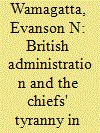

|
|
|
|
|
| Publication |
2009.
|
| Summary/Abstract |
This article argues that the chiefs' tyranny in early colonial Kenya had its roots in the British administrative style since the Government needed strong-handed local leaders to enforce its unpopular laws and regulations. That was why the chiefs got away with their tyranny because the Government condoned it to a certain extent. They also got away with it because of the alien nature of their positions, their duties and their people inadvertently condoning it. The first generation of chiefs from Kiambu district is used as a case study to illustrate what was happening in the colony during the period under study.
|
|
|
|
|
|
|
|
|
|
|
|
|
|
|
|
| 2 |
ID:
191847


|
|
|
|
|
| Summary/Abstract |
For the first time in its history, Ghana held a referendum in 2018 to divide some of its regions to create new ones. Though the regions are purely administrative, the division faced resistance in some areas and not in others. This study combines qualitative comparative analysis with process tracing to show that the resistance occurred within regions with relatively high support for the opposition party, but only in the combined presence of (traditional) elites competing from either side of the region and controversies regarding claims to (traditional) political authority. Further, it finds a bottom-up mechanism of the resistance, evolving as the threatened interests of stakeholders grew from the community to the regional, national and diaspora levels. As in other African cases, this suggests that the sources of conflicts in Africa are not so much about ethnic differences but more about elites’ unequal access to political and economic resources.
|
|
|
|
|
|
|
|
|
|
|
|
|
|
|
|
| 3 |
ID:
193277


|
|
|
|
|
| Summary/Abstract |
This paper seeks to broaden the framework for understanding the many different roles that traditional leaders play in their communities in sub-Saharan Africa. Using data from an original public opinion survey along the Ghana–Togo border, we find that one of the most important roles of the chieftaincy is to maintain law and order: resolving disputes and keeping the community safe from crime. However, we also find considerable variation in what chiefs are expected to do, how effective they are performing their various tasks, and how much authority they wield in doing so – both over their own subjects as well as over local government officials. We explore several potential sources for this variation, finding that chiefs in Ghana, a former British colony, are expected to do more jobs, are perceived to be more effective, and hold more upward power over local state officials compared with their counterparts in Togo, a former French colony.
|
|
|
|
|
|
|
|
|
|
|
|
|
|
|
|
| 4 |
ID:
183921
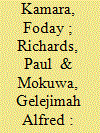

|
|
|
|
|
| Summary/Abstract |
Ebola Virus Disease struck Sierra Leone in May 2014. An international response was instrumental in ending the epidemic by December 2015 and has been extensively documented. Less attention has been paid to local responses. Here, we focus on a case in which there was no infection despite high infection in neighbouring areas. This brings into focus the role of customary public authority in implementing successful controls. We pay particular attention to the activities of a chiefdom Ebola Task force committee chaired by the Paramount Chief. Meetings were characterised by protocol and ceremony, but ‘face time’ served to reinforce, in ritual terms, important messages about quarantine and social distancing. The committee's pronouncements had illocutionary force. Local volunteers translated this ceremonial message into practical action to block imported cases. The analysis of ceremonial competence, we conclude, opens a window into how public authority addresses developmental shocks in Africa.
|
|
|
|
|
|
|
|
|
|
|
|
|
|
|
|
| 5 |
ID:
191861
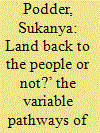

|
|
|
|
|
| Summary/Abstract |
Drawing on empirical research from Pujehun and Port Loko districts in Sierra Leone, this article explains the variable pathways of civic activism mobilised by environmental advocacy, and legal empowerment organisations, in response to two prominent land grabs. By grounding the analysis within the ontology of place, this study examines the dynamic interplay between national politics, global corporate interests, transnational advocacy, and civic agency in each place. The article finds that although the balance of power between these actors matters, the nature of corporate interests involved can be significant in determining the exact trajectory of civic mobilisation, and ultimately its success.
|
|
|
|
|
|
|
|
|
|
|
|
|
|
|
|
| 6 |
ID:
138858


|
|
|
|
|
| Summary/Abstract |
Traditional or indigenous politico-administrative institutions, as opposed to those of western origin, appear to be regaining their once lost allure in Africa. Yet, it is not enough to simply extol or advocate a return to tradition. There is a need to examine the implicit hypothesis of such advocacy. Are traditional institutions truly capable of making a positive contribution to ongoing efforts to promote good governance and, ultimately, development in Africa? The present study attempts to address this question by analysing the traditional system of Meta, an acephalous polity with a tradition of autonomous chiefdoms and village-centric orientation, in the Northwest Region, Cameroon. A sample of village-level initiatives undertaken within the polity’s decentralized indigenous politico-administrative framework, and region-wide development projects under the auspices of centralized modern institutional bodies, are compared. Results show the indigenous systems markedly outperforming their modern counterparts, particularly based on outcome measures of good governance. This provides some empirical justification for recommending the incorporation of traditional institutions in the modern governance process in Cameroon in particular and Africa in general.
|
|
|
|
|
|
|
|
|
|
|
|
|
|
|
|
| 7 |
ID:
179122
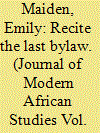

|
|
|
|
|
| Summary/Abstract |
In the study of modern chieftaincy in Africa, scholars have identified chiefs as important intermediaries for promoting increased voter turnout, new health policies and development initiatives. I add to this literature the importance of chiefs as cultural intermediaries. Using recent child marriage reform efforts in Malawi as a case study, I find that chiefs are key actors needed to implement culturally embedded policy changes. Drawing on descriptive evidence from 12 months of fieldwork across all three regions of Malawi, I find that chiefs are responsible for shifting cultural practices related to child marriage. Using a unique blend of democratic and non-democratic powers, chiefs in Malawi are defying expectations and using their position to promote girls’ rights. These findings contribute to our broader understanding of the political and cultural power of modern chiefs.
|
|
|
|
|
|
|
|
|
|
|
|
|
|
|
|
| 8 |
ID:
180617
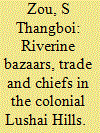

|
|
|
|
|
| Summary/Abstract |
The Lushais maintained commercial contact with the surrounding plains traders in the eighteenth and nineteenth century. The British administrators recognised the importance of trade and bazaar in relation with independent Lushai chiefs and to use them as a diplomatic tool to influence the behaviour of the Lushais. The British introduced riverine bazaars in the interiors of Lushai hills to satisfy Lushais’ desire for tradable commodities; to facilitate the interests of plain merchants in a profitable rubber trade; and to provide security to their subjects within their territories. The failure on the part of the Lushai chiefs to provide security to the marketplaces and resumption of raids in the British territories paved the way for the British to directly interfere in the Lushai affairs. This paper contradicts the Romantic notion of Lushai village communities being self-supporting and isolated autarchy and the notion of self-sufficiency of ‘Indian village communities’ as propagated in the nineteenth century.
|
|
|
|
|
|
|
|
|
|
|
|
|
|
|
|
| 9 |
ID:
151356


|
|
|
|
|
| Summary/Abstract |
To develop leadership skills, division officers should tap the knowledge, experience, and networking power of their chiefs.
|
|
|
|
|
|
|
|
|
|
|
|
|
|
|
|
| 10 |
ID:
121826
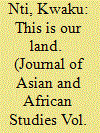

|
|
|
|
|
| Publication |
2013.
|
| Summary/Abstract |
The colonial government attempted to implement the Crown Lands Bill between 1894 and 1897 in Southern Ghana. Among other things, it sought to take control of what was described as 'waste lands' and later 'public lands.' This article focuses on resistance to these bills in which the Aborigines' Rights Protect Society (ARPS) played a leading role on behalf of Southern Ghana. This was one of many precedents to the build-up of tension between the people and the colonial establishment. Among other things, the article examines the ramblings within a colonial administration that attempted to push through its policies against a background of resolute resistance. This led to reluctance on the part of some colonial officers to enforce the policy. The argument is that there was an effective collaboration between the Western-educated elite and the people of coastal Southern Gold Coast in the resistance to these bills. They used official letters of protests, newspaper articles, editorials, and demonstrations to express their dislike for the colonial land policy. In addition, they sent delegations to the colonial government in their effort to resist the attempt to take over 'waste lands' and later 'public lands.' Furthermore, this article argues that the conflict had to do with the different conceptions of land. While the colonial government saw it as part of the economic and political trappings of power, the people of Southern Ghana saw land as a cultural and religious resource that gave them the needed connection with the ancestors in their everyday life.
|
|
|
|
|
|
|
|
|
|
|
|
|
|
|
|
| 11 |
ID:
174418
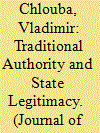

|
|
|
|
|
| Summary/Abstract |
Do African traditional leaders weaken state legitimacy at the local level? Past scholarship raises the possibility that unelected chiefs might undermine trust in national-level institutions. Relying on an original map of areas governed by chiefs and survey data from Namibia, this study examines whether respondents governed by traditional leaders are less likely to trust state institutions. The main finding is that compared to individuals not living under traditional authority, chiefdom residents are more likely to trust government institutions. Partially to alleviate the concern that chiefdom residence is endogenous to trust in national-level institutions, this article uses a genetic matching strategy to compare relatively similar individuals. A further finding is that the association between chiefdom residence and trust in state institutions is considerably weaker and less statistically significant for individuals who do not share ethnicity with their chief. This evidence suggests that traditional leaders’ ability to complement state institutions at the local level is compromised by ethnic diversity.
|
|
|
|
|
|
|
|
|
|
|
|
|
|
|
|
|
|
|
|
|